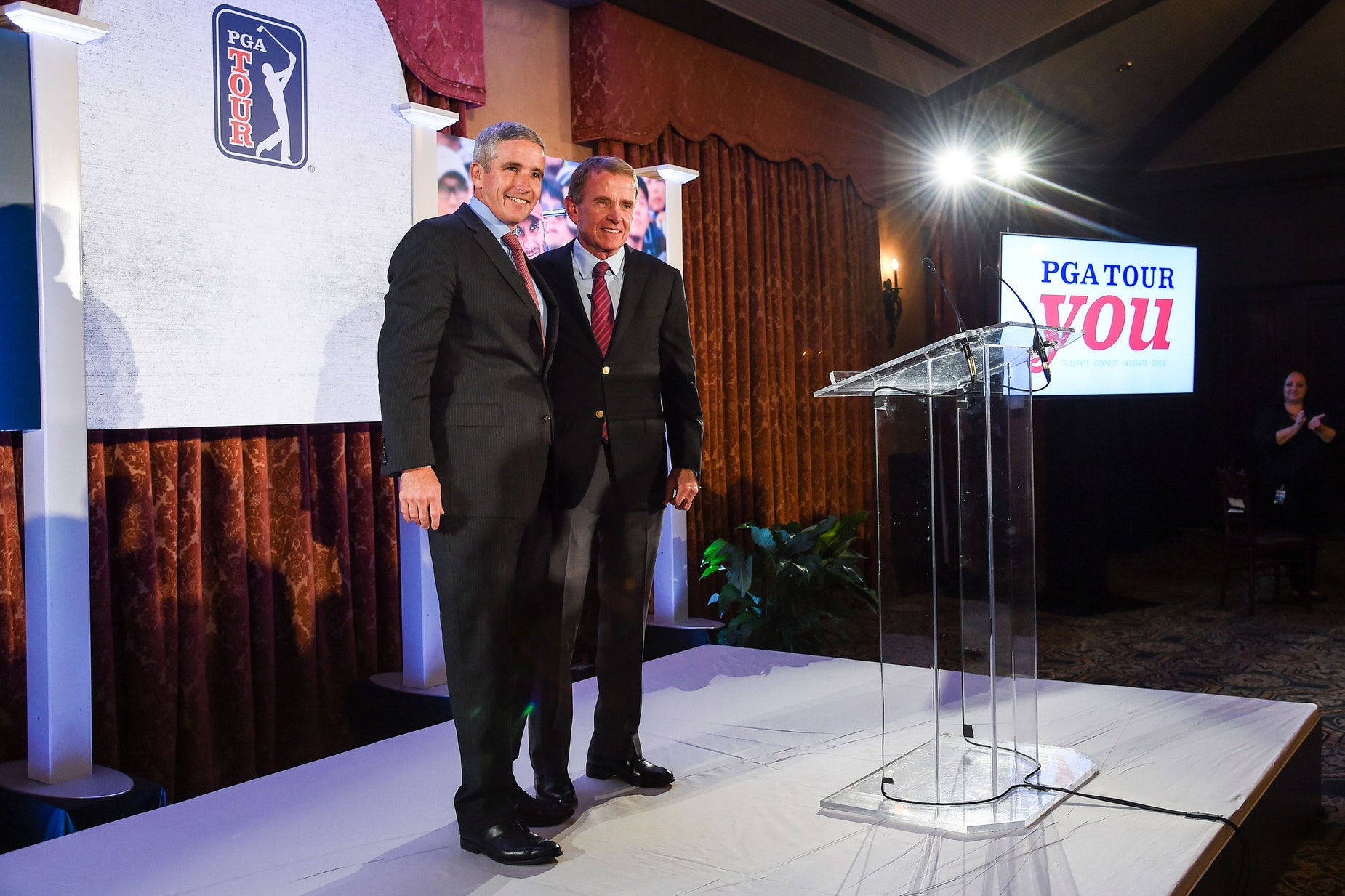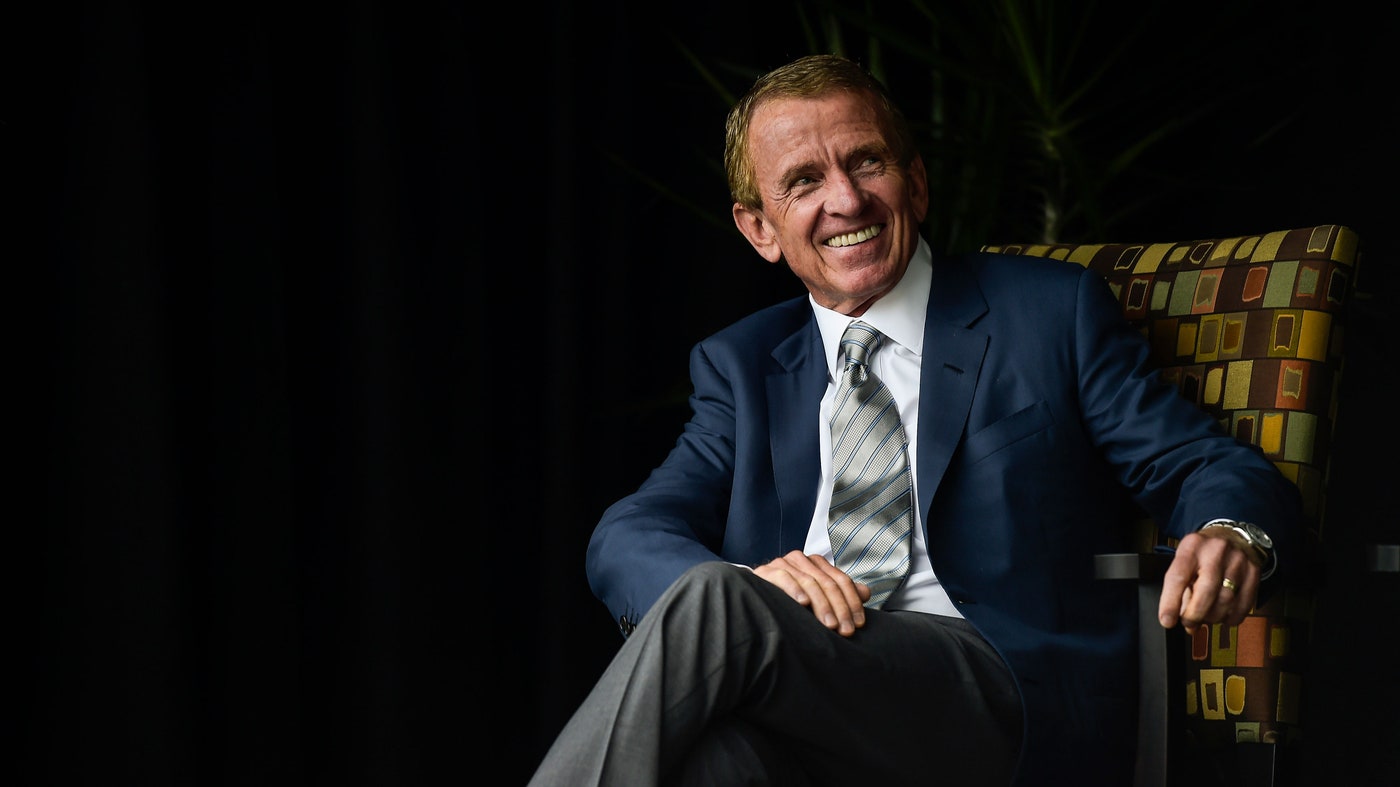By Dave Shedloski
In 22 years as PGA Tour commissioner, Tim Finchem nimbly shepherded the organisation through a myriad of difficult circumstances, from the antitrust battle with the Federal Trade Commission early in his tenure in 1995 to Greg Norman’s World Tour overtures in the late 1990s to the 2008 economic downturn. But none of it, he says, compares to the demands his successor, Jay Monahan, has encountered since he decided to postpone or cancel a number of tour events in the wake of the COVID-19 pandemic.
“I don’t think the challenges we had were in the same ballpark of what he’s dealing with,” Finchem said Monday on a conference call after the World Golf Hall of Fame announced his selection as an inductee in 2021. “I can’t tell you how many people in the last three weeks or months have come up to me and said, Would you like to be commissioner now? The answer is yes, because that’s what you like to do, and I loved doing it.
“But no, Jay … is dealing with a unique set of circumstances … trying to figure out how you can play sports competitions, and this applies to any of the major sports to some extent, and analyze the options that you have and the information that you need to get to make good decisions, and the outreach you have to perform to make sure that the constituencies that you have are knowledgeable about kind of the directions you’re going. It’s a whole other workload level, and to my way of looking at it, very tricky.
“I think Jay, thus far, has done a fabulous job,” Finchem added. “He is, as you know, a superb communicator, and he is going about it with his team in a way that is spectacular in my view.”
To date, the PGA Tour has cancelled nine events and tentatively reconfigured the schedule for the remainder of the year in cooperation with other golf organizations that either have postponed or, in the case of the Open Championship, cancelled major championships. Monahan shut down the Tour’s flagship event, the Players Championship, after the first round was played on March 14. No Tour-affiliated tournaments have been conducted since, but competition is scheduled to resume with the Charles Schwab Challenge reset for June 11-14.
Finchem, who turned 73 on Sunday, served as PGA Tour commissioner from 1994 to 2016 before handing the reins to Monahan, his hand-picked successor. Finchem maintains a role with the tour as an advisor, but he insists that he hasn’t contributed much of late because of the distinct nature of the situation at hand.

Chris Condon/PGA Tour
Finchem poses with incoming commissioner Jay Monahan during the PGA Tour meeting in November 2016.
“He hasn’t leaned on me much at all,” Finchem said of Monahan. “Early on we had a couple conversations about what was happening. From time to time he’ll share with me what direction he’s going. But given what I said earlier, given the load that he’s dealing with … it’s kind of difficult to avoid working in the dark a little bit when you have so many variables sitting out there. He’s got to spend an enormous percentage of his time in those areas, and he’s got a great team.
“He lives about 100 yards from me, so if he wanted to talk to me about something, he knows I’m available. But he’s got to steer the ship. He’s got a million things going on, and I’m quite aware of that.”
During his tenure, Finchem oversaw an exponential growth in prize money, going from $100 million per year on three tours to more than $400 million on six tours when he retired. His biggest initiatives included the Presidents Cup, the FedEx Cup Playoffs and the creation of The First Tee, to which he devotes the most time today. In addition, Finchem was instrumental in seeing the Tour and its tournaments raise $2 billion in charitable contributions. That last accomplishment, he said, with the Tour increasing its charity fundraising from around $35 million to $200 million annually, “is near the top.”
Finchem will be inducted at a date yet to be determined in 2021, along with Tiger Woods—whose career spanned most of Finchem’s as commissioner—and Marion Hollins, an architect, course developer and outstanding female amateur. A fourth inductee is to be announced in the coming days.
Given the current socioeconomic circumstances, Finchem hasn’t allowed himself time to consider who will be his presenter at his induction. He has some ideas on what he plans to give to the Hall of Fame for his display. He hesitatingly revealed one item.
“I’ll tell you what it is without telling you what it says. It’s a letter to me from Arnold Palmer, and it’s one of the coolest things that I have in my office,” he said. “They’re not putting me in the Hall of Fame because I played golf great, so we don’t have to worry about that part of it. It’ll be more about people that I’ve dealt with.
“It just occurs to me how lucky I was to come along at a time that allowed me to get to know Gene Sarazen, Sam Snead, Ben Hogan, Byron Nelson, Arnold Palmer, Jack Nicklaus, Tiger Woods, and then 100 other players. I mean, that to me … I was just lucky, I guess. Every one of those people, just phenomenal people, and very interesting people.”
As for his inclusion in the Hall of Fame, Finchem said, “I kind of, in many ways, don’t feel like I am deserving, because I just had so much fun being in the job for so long. It was absolutely captivating for me year after year after year.”









